The Everlasting Covenant
Chapter 36 – “Another Day.”
The Rest not Received
“For if Joshua had given them rest, then would He not afterward have spoken of another day. There remaineth therefore a rest to the people of God.” Hebrews 4:8-9 margin.
We have seen that although not one word of God’s promises to Israel failed, “the word preached did not profit them, not being mixed with faith in them that heard it,” (Hebrews 4:2), and that a long time after the Lord had given them rest, He set before them, through Joshua, the conditions on which they might enjoy the inheritance.
Passing over a period of more than four hundred years, during which time the history of the children of Israel is a record of apostasy and repentance and apostasy again, we come to the time of David, when the kingdom of Israel was at the height of its power. Although, in demanding a king, the children of Israel rejected God, He did not reject them. It was not God’s design that Israel should ever have any other king than Himself, but they were not content to walk by faith, having a King whom they could not see.
Nevertheless, the kingdom still remained the Lord’s, and therefore He exercised His right to appoint rulers. Even so, it is in all the world. “The earth is the Lord’s, and the fulness thereof.” “His kingdom ruleth over all.”
The people of the world do not recognize Him as King, and boast in the pride of their own Governments; yet “the Most High ruleth in the kingdom of men, and giveth it to whomsoever He will.” “He removeth kings, and setteth up kings.” Daniel 4:32; 2:21.
“There is no power but of God; the powers that be are ordained of God.” Romans 13:1 This is why every soul ought to be subject unto “the higher powers,” and is an evidence that the Lord’s kingdom includes the whole earth, even though the rulers who for a season are allowed to imagine that they are holding the reins, set themselves up against Him. So when in the providence of God, David came to the throne of Israel, “and the Lord had given him rest round about from all his enemies,” 2 Samuel 7:1.
It was in his heart to build a temple to the Lord.
At first the prophet Nathan, speaking his own words, said to him, “Go, do all that is in thine heart,” but afterwards he spoke the word of the Lord, and said that David should not build it. At that time the Lord said to David:–
“I will appoint a place for My people Israel, and will plant them, that they may dwell in their own place, and be moved no more; neither shall the children of wickedness afflict them any more as at the first, and as from the day that I commanded judges to be over My people Israel. Moreover the Lord telleth thee that He will make thee an house.” 2 Samuel 7:10-11. R.V.
The Inheritance and Future in David’s Time
The people of Israel therefore had not yet obtained the rest and the inheritance.
David was a powerful king, and had “a great name, like unto the name of the great men that are in the earth,” yet when he bequeathed the kingdom, with all the material for the building of the temple, to his son Solomon, he said in his prayer to God, “We are strangers before Thee, and sojourners, as were all our fathers; our days on the earth are as a shadow, and there is none abiding.” 1 Chronicles 29:15.
At the time when the kingdom of Israel was as great and powerful as it ever was on this earth, the king declared himself to be as much a stranger and sojourner in the land as was Abraham, who had “none inheritance in it, no, not so much as to set his foot on.”
David in his house of cedar, as well as Abraham, Isaac, and Jacob, who dwelt in tents, “sojourned in the land of promise as in a strange country.” Not only Abraham, Isaac, and Jacob, but Gideon, Samson, Jephthah, David, Samuel, and the prophets, with many others, “having obtained a good report through faith, received not the promise.” Hebrews 11:32-39.
What stronger evidence could there be that the inheritance which God promised to Abraham and his seed was never a temporal possession in “this present evil world”?
Old Jerusalem Signifies Bondage
Since the great king David, at the height of his power, had not received the promise, what utter folly it is to suppose that the promise to restore Israel to their own land can ever be fulfilled by any return of the Jews to old Jerusalem. David was “a sojourner,” waiting for the fulfillment of the promise just the same as Abraham was; it is very evident, therefore, that any restoration of the old order of things would be in direct opposition to the promise.
Those who are building their hopes on “Jerusalem which now is,” are losing all the blessedness of the Gospel. “We have not received the spirit of bondage again to fear,” therefore we will put no confidence in anything connected with old Jerusalem; for “Jerusalem which now is,” “is in bondage with her children; but Jerusalem which is above is free, which is the mother of us all.” Galatians 4:25-26.
When the promise is fulfilled, and the people of Israel really possess the land, and are no more strangers and sojourners in it, their days will no more be as a shadow, but they will abide for ever.
The Promise Still Sure
But
“the Lord is not slack concerning His promise, as some men count slackness; but is longsuffering to usward, not willing that any should perish, but that all should come to repentance.” 2 Peter 3:9.
“The longsuffering of our God is salvation.” 2 Peter 3:15. Even in the days of Moses, the time of the promise was at hand (Acts 7:17), but the people would not have it. They chose this present evil world, rather than the world to come.
But God had sworn by Himself that the seed of faithful Abraham should enter in, and
“seeing therefore it remaineth that some must enter therein, and they to whom it was first preached entered not in because of unbelief; again, He limiteth a certain day, saying in David, To day, after so long a time; as it is said, To day, if ye will hear His voice, harden not your hearts.” Hebrews 4:6-7.
“He Abideth Faithful.”
The unbelief of man cannot make the promise of God of none effect. Romans 4:14.
“If we believe not, yet He abideth faithful; He cannot deny Himself.” 2 Timothy 2:13.
If not a single soul of the natural descendants of Abraham and Jacob proved themselves children of Abraham, but were all children of the devil (John 8:39-44), God’s promise to the seed of Abraham, Isaac, and Jacob would be fulfilled to the letter, for God is able even of the stones of the ground to “raise up children unto Abraham.” Matthew 3:9.
That would simply be a repetition of what He did in the beginning, when He made man of the dust of the ground.
If Joshua had given them rest, then of course there would have been no need of any further day of salvation; but the unfaithfulness of professed followers of God delays the fulfillment, and so God in His mercy grants another day, and that is “To day.” “Behold, now is the accepted time; behold, now is the day of salvation.” 2 Corinthians 6:2. “To day if ye will hear His voice, harden not your hearts.”
Only One Day
Just think of it! even when David lived, it is called “after so long a time.” It was indeed a “long time,” fully five hundred years after the promise might have been fulfilled; and yet, after so much longer a time the Lord still offers “another day.” That other day is to-day; we have not a year given us in which to accept the offer of salvation, not next month, not next week, not even to-morrow, but only to-day.
That is all the time that God has given us–probation is but one day long.
With how much greater force, therefore, the words come to us after so long a time, “To-day, if ye will hear His voice, harden not your hearts.” Do not delay, for we have not even a full day allotted to us. Only one moment–just while one may say “to-day”–is all the time we have.
Moment by moment we breathe the breath of life; we live only one moment at a time; it is impossible to lay up breath one minute for the next. Even so faith is required, not for any time to come, but for the present moment only. So only one moment is given any man in which to accept God’s offer of salvation.
But what a glorious treasure God has given us in to-day—the opportunity of entering into the gate of righteousness. Christ is the door, and by Him all may enter in “while it is called to-day.”
Shall we not accept it as “the day which the Lord hath made” Psalm 118:24, and “be glad and rejoice in it?” “The voice of rejoicing and salvation is in the tabernacles of the righteous;” Psalm 118:15“for we are made partakers of Christ, if we hold the beginning of our confidence steadfast unto the end.” Hebrews 3:14, “For thus saith the Lord God, the Holy One of Israel; In returning and rest shall ye be saved; in quietness and in confidence shall be your strength.” Isaiah 30:15.
To-day is the Time to find Rest
This rest is announced in the Gospel, for Christ says,
“Come unto Me, all ye that labour, and are heavy laden, and I will give you rest. Take My yoke upon you, and learn of Me; for I am meek and lowly in heart; and ye shall find rest unto your souls. For My yoke is easy, and My burden is light.” Matthew 11:28-30.
The people of Israel in old time failed of this rest, not because it was not offered them, but because when the Gospel was preached to them they did not believe; the Gospel that is now preached to us is the very same that was preached to them. (Hebrews 4:2.)
Rest in Faith
The rest is all prepared, for “we which have believed do enter into rest, as He said, As I have sworn in My wrath, If they shall enter into My rest.” Hebrews 4:3.
(In an oath there are two parts–the condition, and the consequence if that condition is unfulfilled. For instance, a man swears, “I will forfeit one thousand pounds, if I do not save that man from prison;”)
God has sworn by Himself that the seed of Abraham–those who have his faith–should enter into rest; and that was equivalent to an oath that they who did not believe should not enter in, and therefore God did indeed sware that the faithless ones should not enter in.
This was not an arbitrary decree, but a statement of fact, for it is as impossible for an unbelieving person to enter into rest as it would be for a man to live and grow strong without eating, drinking, or breathing.
The Rest all Prepared
The fact that “they could not enter in because of unbelief” shows that they would have entered in if they had believed; and the fact that perfect rest was all ready for them, is still further shown by the statement, “the works were finished from the foundation of the world.” Hebrews 4:3.
When works are finished, rest must ensue; accordingly we read that “God did rest the seventh day from all His works.” Hebrews 4:4.
That is what God said in one place of the seventh day; but in another place He said, “They shall not enter into My rest.” Hebrews 4:5.
We see, therefore, that the rest which was ready, and which the children of Israel did not enter into because of unbelief, was the rest connected with the seventh day. For it was God’s rest that was offered them, and it was His rest that they failed to secure, and the seventh day is the Sabbath–rest–of the Lord; it is the only rest of which we read in connection with God–God rested on the seventh day from all His work–and that rest was ready as soon as the work of creation was completed.
God’s Work and God’s Rest
The rest that is promised is God’s rest.
Rest follows labour, but not until the labour is completed. A man cannot rest from a given work until that work is finished. God’s work is creation, a complete, perfect work;
“God saw everything that He had made, and, behold, it was very good. And the evening and the morning were the sixth day. Thus the heavens and the earth were finished, and all the host of them. And on the seventh day God ended His work which He had made; and He rested on the seventh day from all His work which He had made. And God blessed the seventh day, and sanctified it; because that in it He had rested from all His work which God created and made.” Genesis 1:31; 2:1-3.
A Perfect and Complete Work
The work was perfect–it was as good as God Himself could make it, as perfect as He is–and it was all done; therefore the rest was also perfect. There was no taint of the curse; it was absolute, pure, unalloyed rest. God looked upon His work, and there was nothing to cause Him regret; there was nothing to induce Him to say, “If I had it to do over again”–there was no room for alteration or amendment; He was perfectly satisfied and delighted with what He had wrought. Ah, what tongue or pen can describe, or what mind imagine, the sense of boundless satisfaction, the delicious peace and content that must necessarily follow work all done and well done?
This earth affords no such enjoyment, for– “Labour with what zeal we will, Something still remains undone; Something uncompleted still Waits the rising of the sun;” but all that sweet satisfaction and delicious rest God enjoyed in as much greater degree than human mind can imagine it, as God is greater than man, on that seventh day when God rested from all His work.
The Rest into which Adam Entered
This incomparable rest is what God gave man in the beginning. “The Lord God took the man and put him in the garden of Eden to dress it and to keep it.” Genesis 2:15. “Eden” means delight, pleasure; the garden of Eden is the garden of delight; the Hebrew word which in this place is rendered “put” is a word meaning rest; it is the word from which the proper name Noah comes (for the signification, see Genesis 5:29, and margin); therefore Genesis 2:15 may be rendered thus: “And the Lord God took the man, and caused him to rest in the garden of delight to dress it and to keep it.”
God’s Work gives Rest
Man entered into rest, because he entered into God’s perfect, finished work. He was God’s workmanship, created in Christ Jesus unto good works, which God had before prepared, that he should walk in them. “This is the work of God, that ye believe,” John 6:29, and it was solely by faith that Adam could enjoy God’s work and share His rest; for as soon as he disbelieved God, taking the word of Satan instead, he lost everything. He had no power in himself, for he was but dust of the ground, and he could retain his rest and his inheritance only as long as he allowed God to work in him “both to will and to do of His good pleasure.”
Rest in Activity
“We which believe do enter into rest,” because “this is the work of God, that ye believe.” The two statements are not contradictory, but are identical in meaning, because the work of God, which is ours by faith, is completed work, and therefore to enter upon that work is to enter upon rest. God’s rest, therefore, is not idleness, not laziness. Christ said, “My Father worketh hitherto, and I work,” John 5:17, yet “the everlasting God, the Lord, the Creator of the ends of the earth, fainteth not, neither is weary.” Isaiah 40:28.
He works by His word to uphold that which He created in the beginning; so those who have believed God, and have therefore entered into rest, are exhorted to “be careful to maintain good works;” Titus 3:8, but as those good works were obtained by faith, and “not by works done in righteousness, which we did ourselves,” so they are to be maintained by faith; but faith gives rest, and therefore the rest of God is compatible with and necessarily accompanied by, the greatest activity.
Sin and Weariness
It is sin that brings weariness. Adam in the Garden of Eden had work to perform, yet he had absolutely perfect rest all the time he was there, till he sinned. If he had never sinned, such a thing as weariness would never have been known on this earth. Work is no part of the curse, but fatigue is.
“Because thou hast . . . eaten of the tree, of which I commanded thee, saying, Thou shalt not eat of it; cursed is the ground for thy sake; in sorrow shalt thou eat of it all the days of thy life; thorns also and thistles shall it bring forth to thee; and thou shalt eat the herb of the field; in the sweat of thy face shalt thou eat bread, till thou return unto the ground.” Genesis 3:17-19.
Keeping the Rest
Up to this time he had enjoyed perfect rest while labouring. Why?– Because his work was simply to “keep” that perfect work which God had prepared for him and committed to him. “This is the work of God, that ye believe.”
Adam’s work, therefore, consisted in keeping the faith. He was not required to create anything. If he had been asked to create no more than one flower or a single blade of grass, he could have wearied himself to death over the task, and died leaving it unfinished; but God did the work, and placed Adam in possession of it, with directions to keep it, and this he did so long as he “kept the faith.”
Rest in the New Earth
Note that this perfect rest was rest in the new earth, and note further that if sin had never entered, the earth would have remained new for ever. It was sin that brought a blight upon the earth, and has caused it to wax old. God’s perfect rest is found only in a heavenly state, and the new earth was most decidedly “a better country, even an heavenly.”
That which was given to man in the beginning, when he was “crowned with glory and honour,” which he lost when he “sinned, and came short of the glory of God,” but which the Second Adam has in His own right, being crowned with glory and honour, because of the suffering of death, is what God has promised to Abraham and his seed, and will be given to them when the Messiah comes at “the times of restitution of all things.”
A Bit of Eden Still Remains
That perfect, new creation has disappeared–but the rest still remains.
The proof that the works were finished and the rest prepared from the foundation of the world, is that “God did rest the seventh day from all His works.” The Sabbath of the Lord—the seventh day–is a portion of Eden that remains amid the curse; it is a portion of the new-earth rest spanning the abyss from Eden lost till Eden restored.
For as the Sabbath rounded out the creation week, and was the proof that the work was finished, it was the seal of a perfect new creation. Now a new creation is necessary, and it must be brought about by the same power as in the beginning. In Christ all things were created, and “if any man be in Christ he is a new creation;” and the seal of perfection is the same in both cases. The Sabbath therefore is the seal of perfection, of perfect righteousness.
What the Sign Signifies
But it must be understood that Sabbath rest does not consist merely in abstaining from manual labour from sunset on Friday evening till sunset on Saturday;–that is but a sign of the rest, and like all other signs is a fraud if the thing signified is not present.
The true Sabbath rest consists in complete and continuous recognition of God as the Creator and Upholder of all things, the One in whom we live, and move, and have our being, our life and our righteousness. Keeping the Sabbath is not a duty to be discharged in order to obtain the favour of God, but the keeping of the faith by which righteousness is accounted to us.
The Sabbath not a Work
There is no room for the objection that we ought not to keep the seventh- day Sabbath because we are not saved by works; for the Sabbath is not a work, it is a rest—God’s rest. “He that is entered into his rest, he also hath ceased from his own works, as God did from His.” Hebrews 4:10.
True Sabbathkeeping is not justification by works, and is utterly disconnected from any idea of such a thing; it is, on the contrary, justification by faith—it is the absolute rest that comes from perfect faith in the power of God to create a new man and to keep the soul from falling into sin.
God’s Word the Basis of Faith and Rest
But “faith cometh by hearing, and hearing by the word of God,” Romans 10:17, so that it is idle for anybody to profess faith in God while ignoring or rejecting any word of God. Man is to live by every word that proceedeth out of the mouth of God. In every word of God, there is life. If a man knew no more than one word of God, and accepted that word as God’s word indeed, he would be saved by it.
God has compassion on the ignorant, and does not require that men should know a certain amount before they can be saved; but wilful ignorance is a different thing. A person’s ignorance may be the result of deliberately rejecting knowledge, and he who does that, rejects life. For as there is life in every word of God, and the life is one and the same in every word, whoever rejects but one word that clearly comes to him, thereby rejects the whole.
Faith takes the Lord for all that He is,–for all that we see of Him, and for all the infinite unknown.
A Blessing, not a Burden
Let it not be forgotten that the Sabbath is not a burden which God lays upon people (whoever heard of perfect rest being a burden?) but a blessing which He offers them; it is the removal of burdens. “Come unto Me all ye that labour, and are heavy laden, and I will give you rest.”
Instead of forcing it upon people, God says that it is impossible for anybody to share the Sabbath rest, if he does not believe. To the man who says, “I don’t believe that it is necessary for me to keep the Sabbath,” the Lord replies, “You cannot keep it; you shall not enter into My rest; you have no part nor lot in it.”
It is impossible for a man to keep the Sabbath of the Lord without faith, because “the just shall live by faith.”
The Sabbath is God’s rest, God’s rest is perfection, and perfection cannot be obtained except by perfect faith. Mind, however, that no one can claim perfection on the ground that he keeps the Sabbath day. God is the only judge of perfection, and so He alone can tell if one is truly a Sabbath-keeper.
No man can judge another, and no man can say that he is perfect. God said that Job was a good man, but when Job went to talking about his own goodness, he was sharply reproved. When, however, he said, “I abhor myself, and repent in dust and ashes,” he was commended.
Spiritual Rest
“God is a Spirit; and they that worship Him must worship Him in Spirit and in Truth.” John 4:24. His rest therefore is spiritual rest, so that mere physical rest without spiritual rest, is not Sabbath-keeping at all. Only those who are spiritual can truly keep the Sabbath of the Lord. So long as Adam was led by the Spirit, he enjoyed perfect rest, both of body and soul; but as soon as he sinned, he lost the rest. But although the curse upon the earth causes weariness of body, the Sabbath still remains from Eden, the pledge and seal of spiritual rest. the abstaining from all our own work and pleasure on the seventh day–from everything by which we could personally profit–is simply in recognition of God as Creator and Upholder of all things–the one by whose power we live; but this apparent rest is but a farce if we do not really and wholly recognize Him as such, and commit ourselves fully to His keeping.
The Poor Man’s Friend
The Sabbath, therefore, is especially the poor man’s friend; it appeals above all to the labouring man, for it is to the poor that the Gospel is preached. The rich will hardly listen to the Lord’s call, for they are likely to feel content with their lot; they trust in their riches, and feel able to take care of themselves in the present, and as for the future, “their inward thought is that their houses shall continue for ever;” but to the poor man, who knows not how he is to get a living, the Sabbath comes bringing hope and joy, in that it directs his mind to God, the Creator, who is our life. It says, “Seek first the kingdom of God, and His righteousness, and all these things shall be added unto you.”
Instead of being obliged to say, “How can I get a living if I keep the Sabbath?” the poor man may see in the Sabbath the solution of the problem of life.
“Godliness is profitable unto all things, having promise of the life that now is, and of that which is to come.” 1 Timothy 4:8.
A Blessed Day and a Blessed Man
Bear in mind that while the Sabbath day is the seventh day of the week, the rest which the Sabbath day brings to view is continuous. Just as a day is not a man, so there is a difference between blessing a day and blessing a man. God blessed the seventh day (Genesis 2:3), but He blesses men every day. The Sabbath is kept only by those who rest in the Lord all the time.
While nobody can be a Sabbath-keeper and ignore the day upon which God has placed his blessing, it is equally true that the man who does not continually rest in the Lord does not keep the Sabbath.
Doubt and Unbelief not Rest
Thus, rest in the Lord is found only by faith in Him; but faith saves from sin, and living faith is as continuous as the breath, for “the just shall live by faith.” If now a man distrusts the Lord during the week, is doubting and fearing as to how he shall get along, perhaps fretting and worrying, is impatient, or harsh, or in any way unjust to his fellowmen, he is certainly not resting in the Lord–he is not remembering the Sabbath day, to keep it holy; for if he really remembered the Sabbath day, he would know God’s power to provide for him, and he would commit the keeping of his soul to Him in well-doing, “as unto a faithful Creator.”
The Cross of Christ gives Rest
The Sabbath comes revealing Christ the Creator as the burden bearer.
He bears the burdens of the whole world, with all its toil and sin and sorrow, and He bears it easily–His burden is light. “His own self bare our sins in His own body on the tree, that we, being dead to sins, should live unto righteousness; by whose stripes we are healed.” 1 Peter 2:24.
It is in the cross of Christ that we receive life, and are made new creatures.
The power of the cross, therefore, is creative power. So when on the cross Jesus cried, “It is finished,” He was simply announcing that in Him, through His cross, could be obtained the perfect works of God, which were finished from the foundation of the world.
Thus the Sabbath—the seventh-day rest that commemorates creation completed in the beginning–is a blessed reminder of the fact that in the cross of Christ, that same creative power is freely offered to deliver us from the curse, and make us in Him as complete as was everything when God saw it and pronounced it “very good.”
The word of life which is proclaimed to us in the Gospel is “that which was from the beginning.”
He does not fail nor become impatient or discouraged; therefore we may confidently cast all our care on Him. Thus the Sabbath is indeed a delight.
In the Psalm for the Sabbath day, David sang, “Thou, Lord, hast made glad through Thy work; I will triumph in the works of Thy hands.” Psalm 92:4.
The Sabbath means triumphing in the works of God’s hands, not in our own works. It means victory over sin and death– everything connected with the curse–through our Lord Jesus Christ, by whom the worlds were made.
It is a remnant of Eden before the curse came, and therefore he who keeps it indeed really begins his eternal rest–he has the rest, the perfect rest, which the New Earth alone can give.
God’s Invitation to Sabbath Keeping
Now we can understand why the Sabbath occupies so prominent a place in the record of God’s dealings with Israel. It is not because the Sabbath was for them exclusively, any more than salvation was exclusively for them; but it is because Sabbath-keeping is the beginning of that rest which God promised His people in the land of Canaan.
It is sometimes said that the Sabbath was not given to the Gentiles, but it must also be remembered that the land was not promised to the Gentiles. The Gentiles are “strangers from the covenants of promise.” But it is true that the Gentiles-all the world–were called to come to Christ, the living water. “Ho, every one that thirsteth, come ye to the waters.”
The promise to Israel was, and is, that “nations that knew not thee shall run unto thee because of the Lord thy God, and for the Holy One of Israel.” Isaiah 55:5.
Still further in the call, the Lord says:–
“Keep ye judgment, and do justice; for My salvation is near to come, and My righteousness to be revealed. Blessed is the man that doeth this, and the son of man that layeth hold on it; that keepeth the Sabbath from polluting it, and keepeth his hands from doing any evil. Neither let the son of the stranger, that hath joined himself to the Lord, speak, saying, “The Lord hath utterly separated me from His people. . . . Also the sons of the stranger, that join themselves to the Lord, to serve Him, and to love the name of the Lord, to be His servants, every one that keepeth the Sabbath from polluting it, and taketh hold of My covenant; even them will I bring to My holy mountain; and make them joyful in My house of prayer; their burnt offerings and their sacrifices shall be accepted upon Mine altar; for Mine house shall be called an house of prayer for all people. The Lord God which gathereth the outcasts of Israel saith, Yet will I gather others to him beside those that are gathered to him.” Isaiah 56:1-8.
And to both these and those–to all to whom He proclaims peace, both near and far (Isaiah 57:19). –the Lord proclaims this
A Glorious Promise
“If thou turn away thy foot from the Sabbath, from doing thy pleasure on My holy day; and call the Sabbath a delight, the holy of the Lord, honourable; and shalt honour Him, not doing thine own ways, nor finding thine own pleasure, nor speaking thine own words; then shalt thou delight thyself in the Lord; and I will cause thee to ride upon the high places of the earth, and feed thee with the heritage of Jacob thy father; for the mouth of the Lord hath spoken it.” Isaiah 58:13-14.
Those who call the Sabbath a delight–not a burden –shall delight themselves in the Lord.
Why?– Because the Sabbath of the Lord is the Lord’s rest– rest that is found only in His presence, where there is “fullness of joy” and everlasting pleasure.
It is the rest of Eden, for Eden is delight, pleasure; it is the rest of the new earth, for Eden belongs to the new earth.
We have read that those who come to the Lord to keep His Sabbath, shall be made joyful in the house of the Lord, and of them it is said,
“They shall be abundantly satisfied with the fatness of Thy house; and Thou shalt make them drink of the river of Thy pleasures,” literally, “Thy Eden.” Psalm 36:8.
This is the heritage of the Lord, now is the time, to-day is the day in which we may enter upon it, for He is the portion of our inheritance, and in Him we have all things.


 In Chapter Four of Love Wins, Bell criticizes some statements of faith that he has taken from evangelical church websites that reflect Jesus’ teachings on Hell: “The unsaved will be separated forever from God in hell.” After giving a number of examples with which he feels uncomfortable, Bells states,
In Chapter Four of Love Wins, Bell criticizes some statements of faith that he has taken from evangelical church websites that reflect Jesus’ teachings on Hell: “The unsaved will be separated forever from God in hell.” After giving a number of examples with which he feels uncomfortable, Bells states, 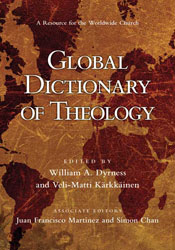 The emergent-friendly, Global Dictionary of Theology, makes a distinction between ‘Hopeful Universalism’ and ‘Convinced Universalism’:
The emergent-friendly, Global Dictionary of Theology, makes a distinction between ‘Hopeful Universalism’ and ‘Convinced Universalism’: Indeed, in the very preface of Love Wins, Bell contradicts Jesus’ teaching that few would actually be saved. Bell writes:
Indeed, in the very preface of Love Wins, Bell contradicts Jesus’ teaching that few would actually be saved. Bell writes: It is a sobering thought that Jesus went on to state in the verses immediately following His teaching on the narrow and broad roads, that false prophets would come in sheep’s clothing (Matthew 7:15-21). Such false prophets stand at the cross roads between the broad and narrow road, claiming to represent Christ, while pointing their followers toward the broad road that leads destruction, assuring them that it eventually leads to Heaven. Consider this for a minute. Isn’t this exactly what Rob Bell is doing?
It is a sobering thought that Jesus went on to state in the verses immediately following His teaching on the narrow and broad roads, that false prophets would come in sheep’s clothing (Matthew 7:15-21). Such false prophets stand at the cross roads between the broad and narrow road, claiming to represent Christ, while pointing their followers toward the broad road that leads destruction, assuring them that it eventually leads to Heaven. Consider this for a minute. Isn’t this exactly what Rob Bell is doing? Rob Bell not only redefines Hell by teaching that it will only be a temporary abode for those who want to leave later, but he redefines Hell by claiming that it is not so much about the after life, but it’s about what you make of the life here and now. In his book, Velvet Elvis, Bell had already stated this position:
Rob Bell not only redefines Hell by teaching that it will only be a temporary abode for those who want to leave later, but he redefines Hell by claiming that it is not so much about the after life, but it’s about what you make of the life here and now. In his book, Velvet Elvis, Bell had already stated this position: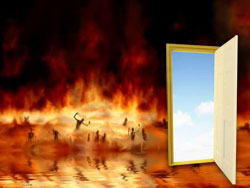 Rob Bell takes every possible liberty to deny reality and to either explain Hell away or get everyone into Heaven, regardless of his or her rejection of God and the Gospel. Bell not only empties Hell of God’s holy wrath, he creates an exit door from the inside out and claims that Hell is merely what we make it. He also claims that most of the imagery of future judgments in Hell were fulfilled on earth in AD 70 (p. 81).
Rob Bell takes every possible liberty to deny reality and to either explain Hell away or get everyone into Heaven, regardless of his or her rejection of God and the Gospel. Bell not only empties Hell of God’s holy wrath, he creates an exit door from the inside out and claims that Hell is merely what we make it. He also claims that most of the imagery of future judgments in Hell were fulfilled on earth in AD 70 (p. 81).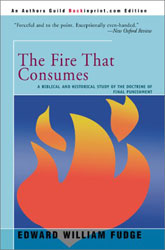 By claiming that the unrepentant wicked will have a chance to get to Heaven from Hell, Rob Bell has gone beyond that of Edward W. Fudge, who states in The Fire That Consumes,
By claiming that the unrepentant wicked will have a chance to get to Heaven from Hell, Rob Bell has gone beyond that of Edward W. Fudge, who states in The Fire That Consumes, 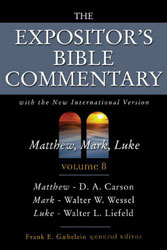 Biblical Scholar D.A. Carson, commenting on Matthew 25:46, says :
Biblical Scholar D.A. Carson, commenting on Matthew 25:46, says :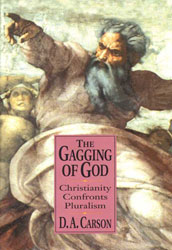 “What is hard to prove, but seems to me probable, is that one reason why the conscious punishment of hell is ongoing is because sin is ongoing.”
“What is hard to prove, but seems to me probable, is that one reason why the conscious punishment of hell is ongoing is because sin is ongoing.” There is hardly any wiggle room for a second chance in hell in these passages or anywhere in Scripture. Bell would have his readers believe of the book of Revelation that
There is hardly any wiggle room for a second chance in hell in these passages or anywhere in Scripture. Bell would have his readers believe of the book of Revelation that  May God give us the grace, in these times of apostasy, to hold fast to Jesus’ teachings and remain faithful to our loving and Holy Lord to the end. May God deliver His bride from the cotton candy Christianity that is endemic in Emergent Churches and among false prophets who lead the lost into believing they can put off repentance until after death.
May God give us the grace, in these times of apostasy, to hold fast to Jesus’ teachings and remain faithful to our loving and Holy Lord to the end. May God deliver His bride from the cotton candy Christianity that is endemic in Emergent Churches and among false prophets who lead the lost into believing they can put off repentance until after death.
Leave a Reply